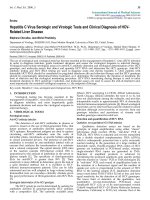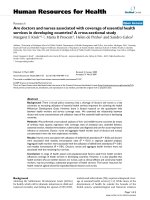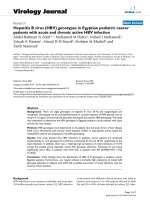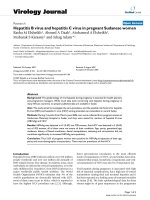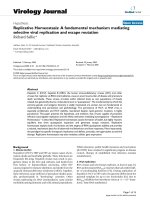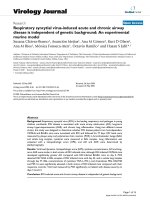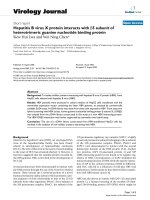Báo cáo sinh học: " Hepatitis C virus genotype 3a with phylogenetically distinct origin is circulating in Pakistan" ppt
Bạn đang xem bản rút gọn của tài liệu. Xem và tải ngay bản đầy đủ của tài liệu tại đây (211.02 KB, 3 trang )
SHOR T REPOR T Open Access
Hepatitis C virus genotype 3a with phylogenetically
distinct origin is circulating in Pakistan
Irshad-ur Rehman, Muhammad Idrees
*
, Muhammad Ali, Liaqat Ali, Sadia Butt, Abrar Hussain,
Haji Akbar, Samia Afzal
Abstract
Background: Hepatitis C virus (HCV) is one of the leading causes of viral hepatitis worldwide and its genotype 3a
is predominant in vast areas of Pakistan.
Findings: The present study reports the first full sequence of HCV 3a isolate PK-1 from Pakistan. This nucleotide
sequence was compared with six other HCV genotype 3a full length sequences from different regions of the world
by using statistical methods of phylogenetic analysis.
Conclusion: The nucleotide difference of these seven sequences shows that HCV genotype 3a of phylogenetically
distinct origin is circulating in Pakistan.
Findings
Hepatitis C virus (HCV) is leading cause of chronic liver
disease [1] with estimated 170-200 million infected per-
sons worldwide [2] including approximately 17 million
in Pakistan [3]. It is positive single stranded RNA virus
first isolated in 1819 and is a member of Flaviviridae
[2,4]. The HCV genome is about 9.6 kb in length con-
sisting of single open reading frame encoding a polypro-
tein of 3,000 amino acids and non-translated regions
located at the 5’and 3’ terminus [5].
The relative prevalence of HCV genotypes varies with
thegeographicareabutgenotypes1,2and3have
worldwide distribution. 1a and 1b ar e the most wide-
spread genotypes in the Europe, [6] USA, [7] and Japan
[8]. HCV subtype 3a is the most common genotype cir-
culating in India [9], Nepal [10] and Pakistan [11]. HCV
genotype 4 prevailing in the Middle East and North
Africa [12], and genotypes 5 and 6 appears to be most
common to South Africa and Hong Kong, respectively
[13]. Genetic analysis of HCV genotype 3a is very
important as it is very sensitive to interferon therapy
compared to the other genotypes.
Butt and colleagues [2] showed that HCV 3a has been
the predominant genotype (causing disease in 62% -
70% patients) in Pakistan based on the last ten years
data (2000-2009), which shows that this genotype has
been successfully spreading in Pakistan. However, it has
not been well characterized genomically. For this pur-
pose, serum sample from patient infected with HCV
was obtained and consensus sequence of HCV genotype
3a isolate PK-1 was determined from cDNA using var-
ious modifi ed methods [14,15]. In the present study, we
report the first full sequence of HCV isolate PK-1 (9474
nucleotides) from Pakistan. This genomic sequence is
phylogen etically distinct from the HCV genotype 3a iso-
lates s equenced in the rest of the countries like USA,
New Zealand, Italy, Australia and Germany (Table 1).
Phylogenetic anal ysis of the isolate PK-1 and all the
full length HCV genotype 3a genomes (n = 7) in the
GenBank database (Table 1) by using MEGA4 software
package. Two d ifferent methods (UPGMA method and
Neighbor Joining (NJ) method) of the phylogenetic ana-
lysis were used as described previously [16]. Evolution-
ary distances were also estimated by using methods
previously reported by Tamura et al [16].
The full length genomic sequences of HCV 3a
reported from USA, New Zealand, Italy and Australia
were clustered together while Pakis tan i isolate is shown
phylogenetically distinct by 500 replicates bootstrap analy-
sis (Figure 1). Estimates of evolutionary divergence
between the sequences (Table 1) shows that the Pakistani
isolatehaveevolutionarydistanceof0.085-0.103tothe
* Correspondence:
Division of Molecular Virology, National Centre of Excellence in Molecular
Biology, University of the Punjab, 87-West Canal Bank Road Thokar Niaz Baig
Lahore-53700, Pakistan
Rehman et al. Genetic Vaccines and Therapy 2011, 9:2
/>GENETIC VACCINES
AND THERAPY
© 2011 Rehman et al; licensee BioMed Central Ltd. This is an Open Access artic le distributed under the terms of the Creative Commons
Attribution Lice nse (http://c reativecommons.org/licenses/by/2.0), which permits unrestricted use, distribution, and reproduction in
any medium, provided the original work is properly cited.
rest of all the full length se qu ences however, the a verage dis-
tance between all these sequences is 0.0655 ± 0.0071 (Table
2). The analysis also suggests that PK-1 and American
isolate (D28917) are t he earliest phylogenetic representa-
tives of the HCV genotype 3a that has been successfully
spreading in Pakistan and USA respectively, while the
rest of the isolates are their la te derivatives spreading in
Germany, Italy, New Zealand and Australia. As 3a is the
predominant genotype in Pakistan, its sequencing data
and evolutionary analysis will help in evaluation and
development of new antiviral therapies and possible vac-
cine development. Moreover, the association of HCV
genotype 3a full length nucleotide sequences with the
epidemiology, severity of disease and its response to
interferon therapy needs to be evaluated.
Table 1 List of the hepatitis C virus genotype 3a
sequences used in the analysis.
S.
No.
GenBank accession
No.
Country Strain*
1 D17763 New
Zealand
2005-NZL1
2 X76918 Germany 2005
3 D28917 USA 2005-HCV-K3a/650
4 AF046866 Australia 2007-CB
5 Gu294484/Pk Pakistan 2010-PK-1
6 GU814263 Italy 2010-S52
7 GU814264 Italy 2010-S52 (Synthetic
construct)
*Year of publication of the genome in GenBank and strain if assigned.
GenBank accession numbers, place of isolation, isolate name and publishing
year are also mentioned.
D
*8D,WDO\
*8D,WDO\
'D1HZ=HDODQ
G
$)D$XVWUDOLD
;D*HUPDQ\
'D86$
*XD3DNLVWDQ
E
*8D,WDO\
*8D,WDO\
$)D$XVWUDOLD
;D*HUPDQ\
'D1HZ=HDODQG
'D86$
*XD3DNLVWDQ
Figure 1 The bootstrap orig inal phylogenetic tree of hepatitis C virus (HCV) genotype 3a isolates from different regions of the world
based on complete genome sequences inferred from 500 replicates representing the evolutionary relationship. Branches corresponding
to partitions reproduced in less than 50% bootstrap replicates are clustered together while; branch lengths are measured by the scale in the
same units as those of the evolutionary distances. GenBank accession numbers, genotype and place of isolation are mentioned for all the
isolates. (a) UPGMA analysis (b) Neighbour-Joining method describing the evolutionary relationship between the HCV full length sequences.
Rehman et al. Genetic Vaccines and Therapy 2011, 9:2
/>Page 2 of 3
Acknowledgements
Sources of support: This work was partially supported by the Higher
Education Commission of Pakistan.
Authors’ contributions
MI conceived of the study. IR, SB, SA, HA and AH performed the sequencing
studies. MA and IR organized the data and drafted the manuscript. SB, LA
and AH helped MA in sequence alignment and evolutionary analysis. All the
authors read and approved the final manuscript.
Competing interests
The authors declare that they have no competing interests.
Received: 5 December 2010 Accepted: 6 January 2011
Published: 6 January 2011
References
1. Poynard T, Ratziu V, Benhamou Y, Opolon P, Cacoub P, Bedossa P: Natural
history of HCV infection. Best Pract Res Clin Gastroenterol 2000, 14:211-228.
2. Butt S, Idrees M, Akbar H, Rehman I, Awan Z, Afzal S, et al: The changing
epidemiology pattern and frequency distribution of hepatitis C virus in
Pakistan. Infect Genet Evol 2010, 10(5):595-600.
3. Idrees M, Lal A, Naseem M, Khalid M: High prevalence of hepatitis C virus
infection in the largest province of Pakistan. J Dig Dis 2008, 9:95-103.
4. Ogata N, Alter HJ, Miller RH, Purcell RH: Nucleotide sequence and
mutation rate of the H strain of hepatitis C virus. Proc Natl Acad Sci USA
1991, 88:3392-3396.
5. Lemon SM, Walker CM, Alter MJ, Yi M: Fields Virology. Lippincot Williams
and Wilkins, Philadelpia. Hepatitis C virus; 2007, 1253-1304.
6. Dusheiko G, Main J, Thomas H: Ribavirin treatment for patients with
chronic hepatitis C: results of a placebo-controlled study. Hepatology
1994, 25:591-598.
7. Zein NN, Persing DH: Hepatitis C Genotypes: current trends and future
implications. Mayo Clin Proc 1996, 71:458-462.
8. Takada NS, Takase S, Takada A, Date T: Differences in the hepatitis C virus
genotypes in different countries. J Hepatol 1993, 17:277-283.
9. Singh B, Verma M, Verma K: Markers for transfusion associated hepatitis
in North Indian blood donors: prevalence and trends. Jpn J Infec Dis
2004, 57:49-51.
10. Tokita H, Shrestha SM, Okamoto H, Sakamoto M, Horikita M, et al: Hepatitis
C virus variants from Nepal with novel genotypes and their classification
into the third major group. J Gen Virol 1994, 75 :931-936.
11. Idrees M, Riazuddin S: Frequency distribution of hepatitis C virus
genotypes in different geographical regions of Pakistan and their
possible routes of transmission. BMC Infect Dis 2008, 8:69.
12. Abdulkarim AS, Zein NN, Germer JJ, Kolbert CP, Kabbani L, Krajnik KL:
Hepatitis C virus genotypes and hepatitis G virus in hemodialysis
patients from Syria: identification of two novel hepatitis C virus
subtypes. Am J Trop Med Hyg 1998, 59:571-576.
13. Simmonds P, Holmes EC, Cha TA, Chan SW, McOmish F, Irvine B:
Classification of hepatitis C virus into six major genotypes and a series
of subtypes by phylogenetic analysis of the NS-5 region. J Gen Virol 1993,
74:2391-2399.
14. Bracho MA, Saludes V, Martro E, Bargallo A, González-Candelas F, Ausina V:
Complete genome of a European hepatitis C virus subtype 1 g isolate:
phylogenetic and genetic analyses. Virol J 2008, 5:72.
15. Chamberlain RW, Adams N, Saeed AA, Simmonds P, Elliott RM: Complete
nucleotide sequence of a type 4 hepatitis C virus variant, the
predominant genotype in the Middle East.
J Gen Virol 1997, 78:1341-1347.
16. Tamura K, Dudley J, Nei M, Kumar S: MEGA4: Molecular Evolutionary
Genetics Analysis (MEGA) software version 4.0. Mol Biol Evol 2007,
24:1596-1599.
doi:10.1186/1479-0556-9-2
Cite this article as: Rehman et al.: Hepatitis C virus genotype 3a with
phylogenetically distinct origin is circulating in Pakistan. Genetic Vaccines
and Therapy 2011 9:2.
Table 2 Estimates of evolutionary divergence between sequences with standard error estimates.
Sequence 1 Sequence 2 Dist Std. Err
Gu294484(3a)/Pakistan D17763(3a)/New Zealand 0.0858383 0.0100783
Gu294484(3a)/Pakistan GU814263(3a)/Italy 0.0929113 0.0108032
D17763(3a)/New Zealand GU814263(3a)/Italy 0.0480462 0.0056442
Gu294484(3a)/Pakistan GU814264(3a)/Italy 0.0945252 0.0110770
D17763(3a)/New Zealand GU814264(3a)/Italy 0.0492012 0.0058641
GU814263(3a)/Italy GU814264(3a)/Italy 0.0016043 0.0004740
Gu294484(3a)/Pakistan AF046866(3a)/Australia 0.0965145 0.0109635
D17763(3a)/New Zealand AF046866(3a)/Australia 0.0520425 0.0061060
GU814263(3a)/Italy AF046866(3a)/Australia 0.0499546 0.0059291
GU814264(3a)/Italy AF046866(3a)/Australia 0.0508833 0.0061427
Gu294484(3a)/Pakistan X76918(3a)/Germany 0.0945054 0.0110161
D17763(3a)/New Zealand X76918(3a)/Germany 0.0533185 0.0065799
GU814263(3a)/Italy X76918(3a)/Germany 0.0518464 0.0066160
GU814264(3a)/Italy X76918(3a)/Germany 0.0526615 0.0067952
AF046866(3a)/Australia X76918(3a)/Germany 0.0550679 0.0067483
Gu294484(3a)/Pakistan D28917(3a)/USA 0.1032085 0.0119522
D17763(3a)/New Zealand D28917(3a)/USA 0.0673865 0.0078749
GU814263(3a)/Italy D28917(3a)/USA 0.0666617 0.0075880
GU814264(3a)/Italy D28917(3a)/USA 0.0676199 0.0077599
AF046866(3a)/Australia D28917(3a)/USA 0.0704518 0.0080246
X76918(3a)/Germany D28917(3a)/USA 0.0712210 0.0083935
* All the positions containing missing data and gapes were eliminated.
Rehman et al. Genetic Vaccines and Therapy 2011, 9:2
/>Page 3 of 3


